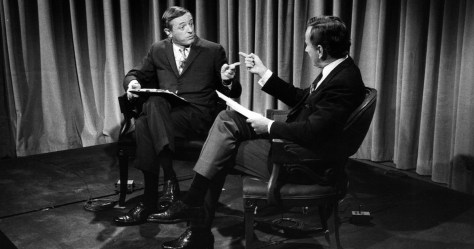By Dennis Hartley
(Originally posted on Digby’s Hullabaloo on November 5, 2016)

If you’re like me (and isn’t everybody?) you’ve either mailed your ballot or made up your mind already, so you’ve just about had it up to “here” what with the negative ads and the polling and gnashing of teeth. And this election in particular has me in an unprecedented state of anxiety as November 8 approaches. I’m not sure why, I mean, there’s not much riding on it…except the future of American democracy, and the possibility of an orange fascist sitting in the Oval Office come January. However, being a glutton for punishment (and applying the inoculation theory), I’ve found that one of the best therapies for getting through the final several days of pins and needles before Election Tuesday is to dust off a few of my favorite election-themed movies and give them a spin:
Don’s Party – Oddly enough, my favorite election night film has nothing to do with American politics. Director Bruce Beresford (Breaker Morant) sets his story on Australia’s election night, 1969. Outgoing host Don and his uptight wife are hosting an “election party” for old college chums at their middle-class suburban home.
Most of the guests range from the recently divorced to the unhappily married. Ostensibly a gathering to watch election results, talk politics and socialize, Don’s party deteriorates into a primer on bad human behavior as the booze kicks in. By the end of the night, marriages are on the rocks, friendships nearly broken and guests are skinny dipping in the vacationing neighbor’s pool.
Yet, this is not just another wacky party film. David Williamson’s script (which he adapted from his own play) offers many keen observations about elitism, politics, and adult relationships. Savagely funny, brilliantly written and splendidly acted.

Election – Writer-director Alexander Payne and creative partner Jim Taylor (Sideways, About Schmidt) followed up their 1995 feature film debut, Citizen Ruth, with this biting 1999 sociopolitical allegory, thinly cloaked as a teen comedy (which it decidedly is not).
Reese Witherspoon delivers a pitch perfect performance as the psychotically perky, overachieving Tracy Flick, who makes life a special hell for her brooding civics teacher, Mr. McAllister (Matthew Broderick). Much to Mr. McAllister’s chagrin, Tracy is running a meticulously organized and targeted campaign for school president. Her opponent is a more popular, but politically and strategically clueless jock (why does that sound so familiar?).
Payne’s film is very funny at times, yet it never pulls its punches; there are some painful truths about the dark underbelly of suburbia bubbling beneath the veneer (quite similar to American Beauty, which interestingly came out the same year).

Medium Cool – What Haskell Wexler’s unique 1969 drama may lack in narrative cohesion is more than made up for by its importance as a sociopolitical document. Robert Forster stars as a TV news cameraman who is fired after he makes protestations to station brass about their willingness to help the FBI build files on political agitators via access to raw news film footage and reporter’s notes.
He drifts into a relationship with a Vietnam War widow (Verna Bloom) and her 12 year-old son. They eventually find themselves embroiled in the mayhem surrounding the 1968 Democratic Convention (the actors were filmed while caught up amidst one of the infamous “police riots” as it actually occurred). Many of the issues Wexler touches on (especially regarding media integrity and responsibility) would be more fully explored in films like Network and Broadcast News.

Shampoo – Sex, politics, and the shallow SoCal lifestyle are mercilessly skewered in Hal Ashby’s classic 1975 satire. Warren Beatty (who co-scripted with Robert Towne) plays a restless, over-sexed hairdresser with commitment issues regarding the three major women in his life (excellent performances from Lee Grant, Goldie Hawn and Julie Christie). Beatty allegedly based his character on his close friend, celebrity hairdresser Jay Sebring (one of the victims of the infamous 1969 Tate-LaBianca slayings). The most memorable scene takes place at an election night event.
This was one of the first films to satirize the 1960s zeitgeist with some degree of historical detachment. The late great cinematographer Laszlo Kovacs infuses the L.A. backdrop with a gauziness that appropriately mirrors the protagonist’s fuzzy way of dealing with adult responsibilities.

Best of Enemies – In this absorbing 2015 doc, co-directors Morgan Neville and Robert Gordon recount ABC’s 1968 Democratic/Republican conventions coverage debates between William F. Buckley (from the Right!) and Gore Vidal (from the Left!), culminating in an apoplectic Buckley’s threat (live, on national TV) to give Vidal a right, and a left…after calling Vidal a “queer”. It was not only the birth of TV punditry, but the opening salvo in the (still raging) culture wars. Still, compared to the odious climate of the 2016 election cycle, it almost seems quaint. This is a “must-see” for political junkies.













